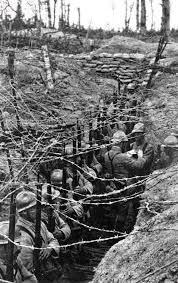
St. Catharines, Ont. AUG. 5/14
Mr. J.W. Sharpe
19th ordered to mobilize at 12 o'clock today hurry back.
R.N. Adie, Lieut.
He was a member of the 19th battalion of the Canadian Expeditionary Force and after being formally mustered at the Exhibition Grounds in Toronto and trained in High Park, he left Toronto on May 12, 1915 to set sail for England. By September of that same year the 19th had been deployed in Boulogne to begin over four years service on the European continent. My grandfather spoke sparingly to us about his experiences and places like Passchendaele (Passiondale to my young ears) and Ypres (or "Wipers" as he called it) became part of the family vocabulary. He was injured in battle and eventually was sent home with shrapnel imbedded in his back that he would carry around for the rest of his life. He married, had children, had many wonderful years with his grandchildren and finally died at the age of 96. Our family, unlike so many others, was one of the lucky ones.
This summer I read Margaret MacMillan's outstanding book, The War that ended Peace, about the failure of leadership and the tragic-comic missteps leading to the outbreak of war in 1914 that resulted in my grandfather receiving that fateful telegram. And, although I will be the first to decry the simplistic carping about the "lessons of history" and the attempt by political leaders and often journalists to pass off facile comparisons ("Putin is just like Hitler") as thoughtful analysis, I do sit and wonder sometimes whether or not we have become so inured to injustice and so focused on the tactical and strategic aspects of warfare that we have become like the leaders of early 20th century Europe who loved their countries but cared little for the lives of their citizens (and even less for the lives of their "enemies"). How many "experts" and political leaders have we listened to on the current war in Gaza who continue to assess events in tactical terms even as hundreds of innocent children are being slaughtered and thousands more injured and displaced from their homes? How much finger-pointing have we witnessed following the downing of flight MH17 over the Ukraine with little actual coverage of the impact of this tragedy on the families of the victims? We are in danger, like the world in 1914, of becoming more focused on strategic and political advantage than on the human cost of the hubris of our political leaders.
This is where real leadership needs to come in. We deserve more than black and white pronouncements about who is right and who is wrong. We need leaders who respect our intelligence enough to discuss issues of national and international import by laying the ambiguities and shades of gray on the table. We need government and opposition parties who are willing to discuss the nuances of an issue and not simply repeat talking points that are designed to either enhance political support among one group of voters or minimize offending another.
In 1914 Canadians did not sit back and play the role of armchair quarterbacks and our Prime Minister did not lecture the Kaiser through op-ed pieces and token sanctions. We may have been naive as we sent our troops in to danger, but we did it because we were principled and determined to stand behind what we believed with action, and not simply rhetoric aimed more at a domestic audience than an international one. It is as wrong to destroy schools and hospitals in Gaza as it is to lob rockets at civilian targets in Israel. We all understand that. Canadians are thoughtful, and fair minded people. In the post-war era, we have taken the lessons that we learned in two World Wars and tried to apply them to a changing global landscape. We saw the dangers of simplifying things into "right and wrong" or "us and them" and tried to find a productive middle ground. We have worked hard as peace-keepers and arbitrators and, in recent years, we understood the difference between geo-politics, and the importance of defending human rights which both kept us out of the war in Iraq, but committed us whole-heartedly in Afghanistan.
Now, on the 100th anniversary of my grandfather going off to war, let's turn down the rhetoric and remember who we have been and what we can become again, let's let principle triumph over politics.

 RSS Feed
RSS Feed